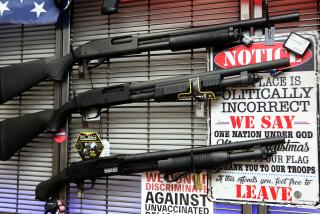Existing Gun Laws Fail to Halt Those Intent on Killing
SACRAMENTO — As the recent spate of mass killings has made clear, even California’s much-touted gun-control laws can do little to keep firearms and ammunition away from criminals bent on murder.
State laws that ban assault weapons and limit handgun purchases, as well as tough penalties for gun-related crimes, did not stop Joseph Ferguson, the 20-year-old Sacramento security guard who authorities say stalked and killed five people last weekend.
By the end of Ferguson’s alleged two-day attack, police said, they had recovered two assault rifles, three handguns, a shotgun and a gym bag jammed with banana-style ammunition magazines. Officials said the assault rifles, including a Chinese-made AK-47, appeared to have been obtained legally by Ferguson or his father before being converted into banned automatic weapons.
And a convicted felon who allegedly killed a sheriff’s deputy in Santa Clarita last month was able to buy thousands of rounds of ammunition for his well-stocked home armory because the law does not require a background check for such purchases.
“Even with strong gun laws,” said gun control advocate Luis Tolley, “there is nothing to prohibit anyone from accumulating an arsenal. There are laws, but there are still huge loopholes.”
Edward E. Worley, lobbyist for the National Rifle Assn. in Sacramento, said new or expanded laws would be ineffective against incidents such as the weekend shootings.
“California already has 670 gun laws on the books as it is,” Worley said. “There is nothing in any of the legislation currently under consideration that would have prevented this incident.”
Worley also fiercely opposes any law that would count the number of weapons owned by individuals.
“How do you define an arsenal?” Worley said. “It’s like saying people have too many golf clubs. I have a lot of rifles but each one of them is for a different purpose.”
Assault rifles and other weapons banned in California are easily available in neighboring states. The sophistication and power of the weapons have also increased as gun manufacturers target the survivalist and paramilitary markets.
“There are a lot of law-abiding people who like to collect firearms who are not a problem,” said Monty Holden, executive director of the California Organization of Police and Sheriffs. “But when they collect them with a siege mentality, it is eventually going to result in a huge battle or confrontation. The bad guys are much better armed than they were five, 10 years ago.”
Except for special units and SWAT teams, most police officers are armed with a handgun, usually a 9-millimeter or more powerful .45-caliber, and a shotgun stored in their vehicles. After the 1997 North Hollywood bank shootout--when lightly armed police found themselves facing a storm of armor-piercing bullets sprayed from automatic assault weapons--many police units upgraded their weaponry.
Holden said there are still limits on what arms police can use, particularly in populated areas.
“We always have to worry about innocent bystanders, whereas the bad guy doesn’t,” Holden said. “That does mean a lot of times we are outgunned,”
In the last 12 years, California has been a leader in gun control legislation, beginning with the nation’s first assault weapons ban in 1989.
Subsequent laws have prohibited cheap “Saturday night special” handguns; required a 10-day waiting period and background check for every gun sale; limited the capacity of ammunition magazines, and restricted handgun purchases to one a month. Another law, requiring that guns be sold with state-approved safety locks, will go into effect in January.
Increased penalties for gun crimes include the law that requires a 10-year sentence for a crime committed by someone in possession of a weapon; a 20-year sentence if the weapon is used during the crime; and life in prison if someone is wounded during the crime.
What is missing, said Tolley, are laws that limit or restrict the number of weapons an individual can own.
One pending bill, SB 950, sponsored by California Atty. Gen. Bill Lockyer, would create a databank that police agencies could use to check whether people who previously purchased handguns have subsequently been convicted of crimes or been served with restraining orders that would make them ineligible to own weapons.
Such a law might have set off earlier alarms in the case of James Allen Beck, a 35-year-old misfit who was convicted of residential burglary and served two years and eight months in prison before his release in 1995.
More to Read
Sign up for Essential California
The most important California stories and recommendations in your inbox every morning.
You may occasionally receive promotional content from the Los Angeles Times.










